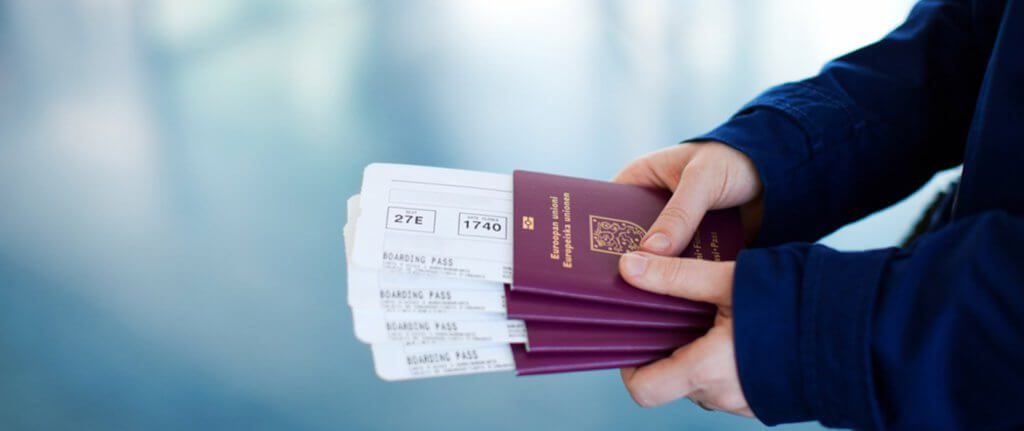Business Travel Guide
Understanding Flight ID Requirements for Business Travel in 2024

Business travel is a vital part of many companies, and with increasing globalization, it is becoming more common for employees to travel internationally for work. One of the most important aspects of business travel is ensuring that all necessary identification requirements are met. Such as flight ID requirements; failure to comply can result in significant delays, missed flights, and even legal consequences.
Domestic and international business travel have different identification requirements, and it is essential to understand these requirements before embarking on any trip. For domestic travel, a government-issued photo ID, such as a passport or driver’s license, is generally sufficient. However, for international travel, a passport is typically required, and additional documentation, such as a visa, may also be necessary.
Understanding the different ID requirements for domestic and international travel, it is also important to be aware of the accepted forms of identification.
Key Takeaways
- Business travel requires compliance with specific identification requirements, which vary depending on whether the travel is domestic or international.
- Passports are generally required for international travel, but other forms of ID may be accepted in certain countries.
- Understanding the accepted forms of identification and ensuring compliance with company travel policies are essential for hassle-free business travel.
Overview of Flight ID Requirements For Business Travel
When it comes to business travel, understanding the identification requirements for flights is crucial. Airlines often have specific rules regarding the type of identification passengers need to present before boarding. This can vary between domestic and international flights, as well as between different airlines.
For domestic flights within the UK, passengers are typically required to provide valid and in-date photographic ID, such as a passport, driving licence (full or provisional), employment ID, military card, or residency card.
However, specific requirements may vary, so business travellers need to check with the airline they are flying with to ensure they have the necessary identification documents.
For international travel, the requirements become more stringent, often necessitating a valid passport and, in some cases, a visa depending on the destination. Business travellers need to familiarise themselves with the identification requirements for the countries they will be visiting to avoid any complications during their journey.
Understanding and adhering to these flight ID requirements is vital for smooth and hassle-free business travel.
Domestic vs International Business Travel
When it comes to business travel, the ID requirements can vary depending on whether the trip is domestic or international. This section will outline the differences between the two.
- Domestic Flight ID Rules
For domestic business travel within the UK, a passport is not required. However, valid photographic ID is required, such as a passport or driving licence (full or provisional), employment ID, military card, or residency card. This may be requested at check-in, security, or boarding.
It is important to note that the type of ID required may vary depending on the airline and airport. For example, some airports may require a passport for all passengers, while others may accept a driving licence or other forms of ID. It is always best to check with the airline or airport before travelling to ensure that you have the correct ID.
- International Flight ID Regulations
For international business travel, a passport is always required. In addition, some countries may require a visa or other documentation, such as a work permit or invitation letter. It is important to check the entry requirements for the country you are travelling to before you book your trip.
When travelling internationally, it is also important to ensure that your passport is valid for at least six months from the date of entry into the country you are visiting. Some countries may also require that you have a certain number of blank pages in your passport.
Accepted Forms of Identification
When travelling for business, it is important to ensure that you have the correct form of identification with you. The following are the accepted forms of identification for international travel:
1. Passport Requirements
A passport is the most widely accepted form of identification for international travel. It is a legal document issued by a government that certifies the identity and nationality of the bearer. It is important to ensure that your passport is valid for the duration of your trip and that it has enough blank pages for any necessary visas.
2. National ID Cards
Some countries issue national ID cards that are accepted as a form of identification for international travel. These cards are usually issued to citizens and can be used instead of a passport when travelling within certain regions, such as the European Union. However, it is important to note that not all countries accept national ID cards as a valid form of identification.
3. Driver’s Licences
In some cases, a driver’s licence may be accepted as a form of identification for domestic travel. However, it is important to note that a driver’s licence is not a valid form of identification for international travel.
Other Acceptable ID Documents
Other acceptable forms of identification for international travel may include:
- A government-issued identity card
- A military ID card
- A permanent resident card
- A refugee travel document
It is important to check with the airline or travel agent to ensure that the form of identification you intend to use is acceptable for your specific travel itinerary.
Company Travel Policy Compliance
When it comes to business travel, companies need to ensure that their employees comply with the company’s travel policy. This policy outlines the rules and regulations for booking flights, accommodation, and transportation.
Compliance with the policy helps companies control travel costs, ensure employee safety, and simplify the approval process.
One way to encourage compliance with the travel policy is to create a step-by-step list and define the limits for a budget. This not only encourages compliance but also empowers employees to arrange their business trips. It can help foster a more independent working environment.
Another way to ensure compliance is to educate travellers about the policy and all its essential information. Conveying the policy and all its essential information personalised uniquely to the travel destination and employee is an excellent way to educate the traveller.
Companies can also compile a list of trusted and approved travel vendors. This helps to cut rogue bookings and simplifies approvals. It also allows companies to budget, report on travel expenses and activity, and reconcile bookings.
Pre-Travel Preparation
When preparing for business travel, certain requirements must be met to ensure a smooth and hassle-free trip. Specifically, it is essential to check the visa and work permit requirements for the destination country, as well as provide advance passenger information.
Visa and Work Permit Considerations
Before travelling, it is crucial to check the visa requirements for the destination country. Some countries require a visa for entry, while others may allow visa-free entry or issue visas upon arrival.
It is important to note that visa requirements can vary depending on the purpose of the trip, the length of stay, and the nationality of the traveller.
In addition to visas, it is also important to check work permit requirements for the destination country. If the purpose of the trip is to conduct business, it may be necessary to obtain a work permit or other documentation to legally work in the country. Failure to obtain the necessary permits can result in fines, deportation, and other legal consequences.
Advance Passenger Information
Providing advance passenger information (API) is a requirement for many airlines and countries. API includes personal information such as name, passport number, and date of birth, and is used to enhance security and immigration procedures.
It is essential to provide accurate and up-to-date API to avoid delays or complications at check-in or immigration.
To provide API, travellers should check with their airline or travel agent for specific requirements.
Some airlines allow API to be provided online or via mobile app, while others require it to be provided at the airport check-in desk. It is important to provide API in advance to avoid last-minute stress and ensure a smooth travel experience.
Special Cases
Frequent Business Travellers
Frequent business travellers may find it beneficial to enrol in a Trusted Traveller Program, which can provide expedited screening and reduced wait times at security checkpoints. These programs require background checks and fingerprinting and may have additional fees associated with them.
Trusted Traveller Programs include:
- Global Entry: This program is available to U.S. citizens and permanent residents, and includes expedited clearance for pre-approved, low-risk travellers upon arrival in the United States.
- Nexus: This program is available to citizens and permanent residents of Canada and the United States, and includes expedited clearance at the border.
- Registered Traveller: This program is available to citizens and permanent residents of the United Kingdom, and includes expedited clearance at passport control.
Employee Background Checks
Some companies may require their employees to undergo background checks before they are allowed to travel for business. These checks may include criminal history, credit checks, and verification of employment history.
It is important for employees to understand their company’s policies regarding background checks and to ensure that they have provided all necessary information to their employer promptly. Failure to pass a background check may result in the employee being unable to travel for business purposes.
Technology and ID Verification
Biometric Screening
Biometric screening is an advanced technology that verifies a traveller’s identity using unique physical characteristics like fingerprints, facial recognition, and iris scans.
It is increasingly being used to improve security and speed up the process of ID verification at airports. Biometric screening is more accurate and efficient compared to traditional methods such as checking passports or IDs.
It also eliminates the need for physical contact, which is especially important during the COVID-19 pandemic.
Electronic Travel Authorisation
Electronic Travel Authorisation (ETA) is a digital system that allows travellers to apply for permission to enter a country before they arrive. It is a mandatory requirement for some countries and can be obtained online.
ETA is designed to enhance security by pre-screening travellers and ensuring that they meet the entry requirements before they arrive. It also reduces the time and hassle of obtaining a visa on arrival. For instance, the UK requires an ETA for business travellers from countries that are not part of the European Economic Area (EEA).
Legal Implications of Non-Compliance
When it comes to business travel, there are strict legal requirements that must be adhered to. Failure to comply with these requirements can have serious legal implications for both the company and the individual traveller.
One of the most important legal requirements for business travel is the need for valid identification. This includes a passport, driving license or other government-issued ID. Without proper identification, an individual may be denied entry into a foreign country or even detained by local authorities. Therefore, travellers must ensure they have the correct ID before embarking on any business trip.
In addition to ID requirements, there are also strict regulations regarding the transportation of goods and materials. This includes items such as hazardous materials, firearms, and certain types of food products. Failure to comply with these regulations can result in fines, legal action, and even imprisonment.
It is also important to note that non-compliance with legal requirements can hurt a company’s reputation. This can lead to a loss of business and damage to the brand’s image. Therefore, companies must take all necessary steps to ensure compliance with legal requirements when it comes to business travel.
Frequently Asked Questions
What forms of identification are required for domestic business flights in the UK?
For domestic business flights in the UK, passengers are required to carry a valid form of photo identification such as a passport, driving license, or national ID card. However, if the passenger is travelling within the UK, they may use a valid work ID with a photo, such as a company ID card or a police warrant card.
Are there specific ID requirements for business travellers on international flights?
Yes, there are specific ID requirements for business travellers on international flights. Passengers are required to carry a valid passport, which must be valid for at least six months from the date of entry into the destination country. In addition, some countries may require a visa or other travel documents, so it is essential to check the entry requirements of the destination country before booking a flight.
What is the checklist of travel documents needed for overseas business trips?
The checklist of travel documents needed for overseas business trips includes a valid passport, visa (if required), travel insurance, and any other necessary travel documents such as work permits, health certificates, or vaccination records. It is essential to check the entry requirements of the destination country before booking a flight to ensure that all necessary travel documents are in order.
Which three types of travel documents are essential for business travel?
The three types of travel documents that are essential for business travel are a valid passport, visa (if required), and travel insurance. These documents are necessary to ensure that the passenger is allowed entry into the destination country, and they protect in case of unexpected events such as medical emergencies or trip cancellations.
What identification is needed for a local business flight within the UK?
For a local business flight within the UK, passengers are required to carry a valid form of photo identification such as a passport, driving license, or national ID card. However, if the passenger is travelling within the UK, they may use a valid work ID with a photo, such as a company ID card or a police warrant card.




